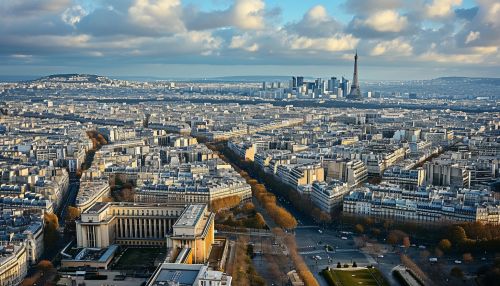Economy of France
Overview
The French economy, the seventh largest in the world by nominal GDP, is a mixed economy that combines extensive private enterprise (nearly 2.5 million companies registered) with substantial (though declining) state enterprise and government intervention. The government retains considerable influence over key segments of infrastructure sectors, with majority ownership of railway, electricity, aircraft, nuclear power and telecommunications.
History
The economic history of France has been marked by several distinct periods: the pre-industrial period, the industrial revolution, the second industrial revolution, the post-war economic boom, and the current era since 1973.
Structure
The French economy is diversified across all sectors. The government has partially or fully privatized many large companies, including Air France, France Telecom, Renault, and Thales. However, the government maintains a strong presence in some sectors, particularly power, public transport, and defense industries.
Sectors
Agriculture
France is the European Union's leading agricultural producer, accounting for about one-third of all agricultural land within the EU. Northern France is characterized by large wheat farms. Dairy products, pork, poultry, and apple production are concentrated in the western region. Beef production is located in central France, while the production of fruits, vegetables, and wine ranges from central to southern France.
Industry
The French industry has been a major area of economic activity, producing a wide range of goods, from textiles and clothing to automobiles, chemicals, airplanes, and high-tech products.
Services
The service sector is large and growing. It is characterized by a wide range of businesses, including banking and insurance, consulting, and public services. Tourism is a significant contributor to the French economy, with France being the most visited country in the world.
Economic policy
The French government has a significant influence on the country's economy, with substantial state ownership in key sectors and considerable regulatory power. The government's economic policy includes measures to promote investment and to ensure that enterprises have the capital to grow and innovate.
International economic relations
France is a member of the European Union, the World Trade Organization, and the Organisation for Economic Co-operation and Development, and is one of the world's largest trading nations. Major exports include machinery and transportation equipment, aircraft, plastics, chemicals, pharmaceutical products, iron and steel, and beverages.
Challenges and prospects
The French economy faces several challenges, including a high rate of unemployment, a low rate of labor force participation, and a high public debt. However, it also has several strengths, including a high level of education among its workforce, a strong industrial base, and a globally competitive agricultural sector.
See Also


